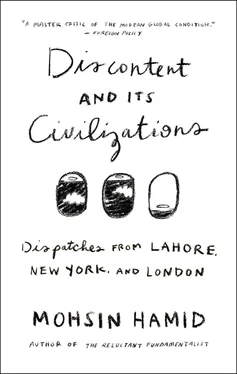We dated long-distance, an exciting and near-bankrupting experience of transcontinental flights, prepaid calling cards, and garbled Internet telephony. Two years later we were married.
London taught me the pleasures of being a husband. Restaurants, museums, cinemas, pizza delivery, late-night video-on-demand: these things acquired entirely new romantic hues. We went for hour-long walks at midnight, gave directions to tourists. We found we could always get a table, even on a crowded night, at the Churchill Arms.
And so, after five years of living here, I find myself beginning to commit to London in completely unexpected ways. For the first time in my life, I am looking to buy a flat. Not because I dream of getting rich off my investment, but because I dream of staying.
The friend who has my old JBL speakers has now moved from New York, via Vancouver, to Amsterdam. I have never asked for the speakers back, but I often tell him that he ought to give this city a try.
There is something magical about London. It can coax a water lily to tie its roots to land.
(2006)
LAST JUNE, on a hot day in London — hot enough to remind me of Lahore — I got on the Tube and found myself in a crowded carriage with one empty seat. Nobody moved to take it, which seemed strange because several people were standing. Then I noticed the fellow in the next seat over. He was, I guessed, of Pakistani origin, with intense eyes, a prayer cap, a loose kurta, and the kind of mustacheless beard that tabloids associate with Muslim fundamentalists. He could have been my cousin.
Look at this racial profiling, I thought to myself. Here’s this fellow, perfectly harmless, and everyone’s staying clear like he’s planning to kill them. And then they wonder why Muslims in Britain feel ostracized.
I took the seat, gave the fellow a smile that meant, “Hello there, brother, we’re on the same side,” and opened my copy of The Economist . And that would have been that.
Except that it wasn’t, because once the doors slammed shut and the train jerked forward, he said, disconcertingly loudly, “Why do Arabs get all the credit?”
I wasn’t sure what to make of his question, so I said, “Excuse me?”
He jabbed his finger at the cover of my magazine. It carried a photograph of Abu Musab al-Zarqawi, by reputation a particularly nasty Jordanian militant, killed a few days previously in Iraq.
“Why do Arabs,” he said again, almost shouting, “get all the credit?”
I observed that he had earphones on, the small fit-in-your-ear iPod variety, and also that people had started staring at us.
“I’m not sure I know what you mean, friend,” I said, forcing another smile onto my face. Then I added, “I’m from Pakistan myself.”
I added this because I wanted to make sure he understood the connection between us. I also added it because he was acting a little oddly and I figured that if he actually was a terrorist he might be less likely to blow himself to smithereens if he thought he was sitting next to another Muslim.
His eyes began to leap from me to the magazine, to the window, to me again. Over and over. It occurred to me that we were getting rather close to the first anniversary of the 7/7 bombings. Didn’t terrorists have a thing about anniversaries?
“And where are you from?” I said coaxingly. Distract him. Keep him talking. Establish a rapport.
“I’m in the security business. Get it? The security business. My own company. And I like music. I bought a system for ten thousand pounds.”
Okay, then. This fellow clearly wasn’t flying on all four engines. And he was nervous. He was sweating like a Swede in the Sahara. And what was that? Yes, he had a bulge under his kurta. Like a money belt. A very, very large money belt.
Play for time. “I’m a bit of a music fanatic myself,” I said. I winced inwardly at my unfortunate use of the word “fanatic,” then went on. “I have this old Carver power amp. Bought it way back in ’93 or ’94. Just the sweetest sound.”
He took his earphones off, slowly, and glared at me. I watched his every move. I wasn’t the only one. And I got the feeling that we had a few eavesdroppers as well. Like that woman reading Jamie Oliver upside down.
Then he said, “I’m on medication, did you know that?”
“Er, no. Are you… all right now?”
“STOP TALKING TO ME!”
Now we had everyone’s attention. “Sure. Okay. Sorry.”
He put his earphones on again. I observed him, James Bond — like, out of the corner of my eye. I wondered how he would trigger the explosives. Would he raise his arm, relying on a hidden detonator built into his sleeve? Or would he have to reach under his kurta and press a button on the bomb itself?
I readied myself for action. I ran kung-fu moves through my mind, super-slow, at Matrix special-effects speed. I would have to grab him, pin his arms to his sides, and hold on while squealing like a schoolgirl for help.
He looked at his watch. So did I. Five o’clock. And not just five o’clock. Exactly, to the second, five o’clock. This was it.
The train started to slow. We were pulling into a station. My station. Just a few more moments. Maybe I would make it.
Nothing happened. We arrived, the doors opened, and he and I simultaneously rose and exited onto the platform. I stood and watched him walk away, wondering if I should say something. He was perhaps the most suspicious person I had ever seen in my life.
But remembering my own experience of “random” searches and multihour detentions at immigration lounges around the world, I thought of what might happen to the fellow if I mentioned him to the authorities. He would be stopped. He would act strangely. Even if he was completely innocent, which he probably was, he might well resist being questioned. And then, through no fault of his own, he might find himself under arrest.
I couldn’t set in motion that sequence of events. So I did nothing, and I hoped I would not discover on the television later that evening that my inaction had made possible a slaughter.
Stepping into the open air, I found my friend, who was visiting me from Pakistan, and told him the story of what had just happened.
He laughed. “You’re just paranoid, yaar,” he said. “You’ve been living here too long.”
(2006)
I NEVER REALLY THOUGHT of myself as a baby person. Children I liked. Children you could talk to, hang out with. My own inner child was alive and well. But babies, the larval, pre-talking, pre-walking form of humanity, had little appeal to me. Yes, babies could look cute. But I’d been in enough relationships to know looks only go so far, particularly when they’re packaged with a high-maintenance need for constant attention.
Then I had one. My baby daughter was born last year. Her name is Dina. About thirty minutes after she arrived in the world, her mother, my wife, was taken off for post-labor surgery. My mother-in-law, traumatized after witnessing her child give birth, was recovering her composure in the hospital courtyard, chain-smoking cigarettes between rounds of prayer. So the nurse handed Dina to me. And then we were alone.
Dina was swaddled in white, lightly streaked in dried blood and other bodily fluids. She weighed seven and a half pounds. About the same as a small dumbbell. But she wasn’t as dense as a dumbbell, so she was bigger, maybe two-thirds the size of a two-liter bottle of soda. She rested in the crook of my arm. I did my best not to move.
Dina breathed. I breathed. We were silent. Then she started to cry. It wasn’t a powerful sound. It was a small, quiet sound. It made me think of lungs that had been squeezed on their way through the birth canal, little wet lungs only just introduced to air.
Читать дальше












